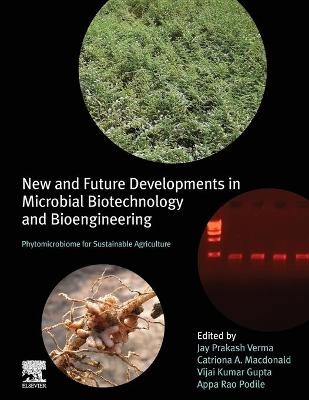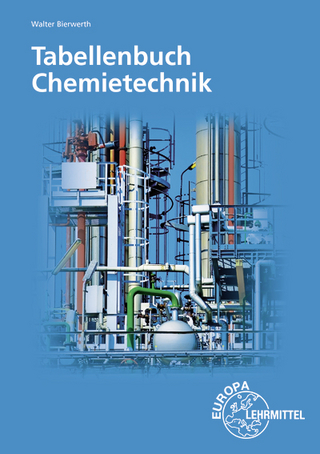
New and Future Developments in Microbial Biotechnology and Bioengineering
Elsevier Science Ltd (Verlag)
978-0-444-64325-4 (ISBN)
An essential resource for students, researchers, and scientists in the fields of biotechnology, microbiology, agronomy, and the plant protection sciences, New and Future Developments in Microbial Biotechnology and Bioengineering: Phytomicrobiome for Sustainable Agriculture highlights the plant growth-promoting activities of the phytomicrobiome and focuses on both its basic and applied aspects and the significant role they play in plant protection.
Dr. Jay Prakash Verma competed his B.Sc., M.Sc. and Ph.D. on plant-microbe interaction and PGPR. He works as a Senior Assistant Professor in IESD, Banaras Hindu University, India, where he started in February 2011. He has more than 11 years of research expertise on rhizosphere microbes and development of effective plant growth promoting microbial consortium as biofertilizer, bio stimulators for multiple crop production under control, and field conditions. His research expertise encompasses biofertilizer, phytomicobiome, bio-pesticide, PGPR, PGPF, sustainable agriculture, plant-soil-microbe interaction, soil fertility and soil health management, pesticide degrading microbes for bioremediation, soil molecular biology and climate resilient agricultural production, and bioethanol production. He has written more than 60 articles that have been cited more than 1831 times and has a cumulative impact factor of over 100. He has more than eight research projects related to plant-microbe interactions. He has been a speark at international conferences in Spain, France, and China. He is serving as Technical Editor for several international journals including Biotechnology, Journal of Applied Sciences, International Journal of Soil Science, Asian Journal of Biological Sciences, and Bacteriology Journal. He is a member of the editorial board for the journals Agriculture for Sustainable Development published by Social and Farmers Welfare Society, Journal of Environmental and Social Sciences, International Journal of Research Studies in Microbiology and Biotechnology, International Journal of Research Studies in Agricultural Sciences, International Journal of Research in Environmental Science, and Microbial Biosystems Journal published by The Arab Society for Fungal Conservation. He acts as a reviewer for various peer-reviewed national and international journals of publishers including Nature Publishing Group, Elsevier, Springer, Willy, and Taylor and Francis. He is also a project evaluator for of The Czech Academy of Sciences, Science Support Division in Czech Republic, European Commission. He is presently a visiting fellow at the Hawkesbury Institute for the Environment, Western Sydney University, Sydney, Australia. Dr. Catriona Macdonald is a research lecturer at the Hawkesbury Institute for the Environment at the University of Western Sydney. With a BSc. and a Ph.D. in the fields of Environmental Microbiology and Microbial Ecology, she has over 12 years’ experience in the field of soil microbiology and nutrient cycling. Her research interests focus on understanding microbial-mediated function under environmental change and interaction with plant communities and how we can utilise the microbial community to overcome associated constraints on productivity and ecosystem function. She has expertise in nutrient cycling, plant-soil interactions, climate change, heavy metals and forensic microbial ecology. Working across natural, agricultural, and managed ecosystems, she aims to improve understanding of how factors such as climate change and land management impact microbial-mediated nutrient transformations and how this feeds back to ecosystem functioning. To achieve this, Dr. Macdonald uses field-based and controlled environment studies to determine rates of nutrient (C, N, and P) transformations, quantify nutrient resource allocation in above- and below-ground pools,= and investigates the function and diversity of key microbial drivers in C, N, and P cycles using a range of in-situ approaches (soil CO2 flux, decomposition, net mineralisation), laboratory assays (MicroResp, enzyme activities, potential mineralisation, degradation rates), and molecular approaches (community profiling and sequencing analysis). She is co-investigator on three large industry-funded interdisciplinary grants related to sustainability: (1) a novel framework to identify, predict, and improve efficiency of bioremediation technology, (2) healthy bee populations for sustainable pollination in horticulture, and (3) pastures under climate extremes. She has more than 35 journal publications and two book chapters, more than 750 citations, and an h-index of 15. She serves on the editorial board of Pedobiologia (Elsevier) and provides scientific review for numberous international peer reviewed journals including Scientific Reports, Soil Biology and Biochemistry, Agriculture Ecosystems and the Environment, and Biodegradation. Vijai K. Gupta has previously worked as- Senior Scientist, ERA Chair VALORTECH, Estonian University of Life Sciences, Estonia; Senior Scientist, ERA Chair Green Chemistry, Tallinn Technical University, Estonia and Senior Researcher, Molecular Glycobiotechnology Group Department of Biochemistry. NUI Galway Ireland. Currently, he working as Professor (Associate) of Biochemistry at UM6P University, Morocco. Dr. Gupta’s present work is focused on the development and optimization of novel enzyme-based bioconversion systems for biorefining and bioenergy, bioactive natural products and biomass to bioproduct valorisation using microbial technologies. He has 122 publications with h-index 36 and RG Score 41.25 Appa Rao Podile is interested in molecular plant-microbe interactions. In the past decade, domain shuffling and swapping of recombinant bacterial chitinases, bioprocess development for production of chitooligosaccharides by enzymatic methods, mechanism of elicitor (harpin) induced cell death, nanotechnology for crop protection, and non-host resistance have been the major areas of research interest. Prof. Podile has been elected Fellow of Indian National Science Academy (INSA, New Delhi), Indian Academy of Sciences (Bangalore), National Academy of Sciences (Allahabad), National Academy of Agricultural Sciences (New Delhi), Academy of Microbiological Sciences (New Delhi), AP Akademy of Sciences, and Founding Fellow of Telangana State Academy of Sciences (Hyderabad). Prof. Podile published about 100 research papers and has over 2,400 citations and an h-index of 26. His lab is supported by Department of Biotechnology as part of Indo-UK project on Biological Nitrogen Fixation.
1. Mechanisms of the phytomicrobiome for enhancing soil fertility and health 2. Impact of agrochemicals application in sustainable agriculture 3. Role of Plant Growth Promoting Rhizobacteria in Degradation of Xenobiotic Compounds 4. Seed inhabiting endophytes: Their role in plant development and disease protection 5. Plant endophytic microorganisms enhancing crop productivity and yield 6. Arsenic – Rice - human health: Understanding the toxic association from microbiome angl 7. Emerging approaches to manipulate the plant microbiome and implications 8. Plant-specific microbiome for environmental stress management: Issues and challenges 9. Development of indigenous microbial consortium for biocontrol management 10. Plant growth promoting rhizobacteria controlling Late blight pathogen, Phytophthora infestans 11. Ecology and performance of rhizosphere and endosphere microbiomes 12. Impact of climate change on soil microbial flora and fauna 13. Plant microbe interaction for changing endophytic colonization to improve plant productivity 14. Role of soil microbes in biogeochemical cycle for enhancing soil fertility 15. Fungi: a potential candidate for sustainable agriculture and agroecosystem 16. Role of fungi in the agricultural sector and its prospects in soil restoration 17. Rhizobacteria adopt biosurfactant production as a strategy in rhizosphere colonization and crop productivity enhancement 18. Rhizosphere Soil Microbiomes: as driver of Agriculture commodity & Industrial application
| Erscheinungsdatum | 28.08.2020 |
|---|---|
| Verlagsort | Oxford |
| Sprache | englisch |
| Maße | 216 x 276 mm |
| Gewicht | 670 g |
| Themenwelt | Naturwissenschaften ► Chemie ► Technische Chemie |
| Technik ► Umwelttechnik / Biotechnologie | |
| Weitere Fachgebiete ► Land- / Forstwirtschaft / Fischerei | |
| ISBN-10 | 0-444-64325-7 / 0444643257 |
| ISBN-13 | 978-0-444-64325-4 / 9780444643254 |
| Zustand | Neuware |
| Haben Sie eine Frage zum Produkt? |
aus dem Bereich


